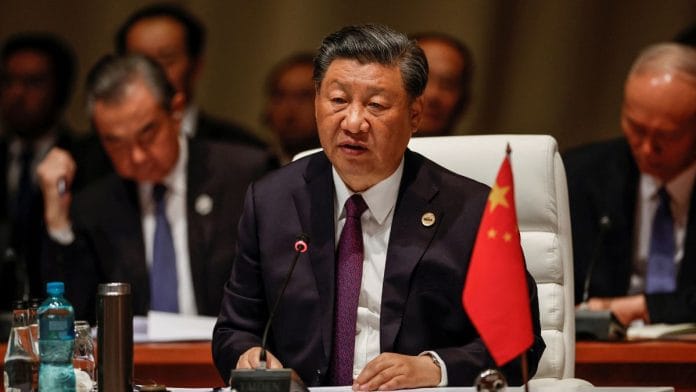Beijing blames New Delhi for trying to shape the agenda of the G20 summit by introducing ‘bilateral topics’ to the meeting, according to an article by China Institutes of Contemporary International Relations, China’s top think-tank. Affiliated with the Ministry of State Security, China’s top spy agency, the think-tank also explains why President Xi Jinping decided to skip the G20 Summit.
The article, titled India’s ‘big plan’ and ‘small mindset’, written by Xu Qin, an assistant researcher at CICIR, was published on WeChat Saturday.
Xu wrote that India violated international norms by hosting a G20 meeting in a “disputed territory” and “thus forced territorial dispute into the G20 agenda”.
“In March this year, the Indian Ministry of Science and Technology hosted a G20 side meeting in the pseudo-‘Arunachal Pradesh’ (our southern Tibetan region), but China did not attend,” he added.
CICIR reportedly advises China’s top decision-making body, the Politburo, on matters related to international relations.
The article was timed to be published on the first day of the G20 summit in New Delhi and to provide Beijing’s rationale behind Xi’s decision to skip the global event.
Also read: At the G20 minus Xi, EU looking to further its China+1 strategy—partnership with Asia
It isn’t domestic troubles or US
So far, we have heard various explanations for Xi’s no-show — from his domestic troubles to complex relations with the United States. Now, authoritative commentary by Chinese experts linked to the government says that Xi decided to skip the summit due to India’s growing regional and global leadership and the introduction of bilateral issues like the border dispute to the summit agenda.
Xi’s decision can’t be attributed to personal reasons or domestic economic problems — the Chinese think-tank has made it clear that Xi had politically motivated reasons to skip the summit.
Xu also explained that India’s attempt to mint itself as the new leader of the emerging economies doesn’t sit well with Beijing. “Representing the ‘Global South’ and proclaiming itself a ‘leader’,” wrote Xu, explaining the crux of Beijing’s discord with New Delhi over the G20 summit.
India wants to fill the ‘power vacuum’ left by the US in the so-called “Global South” by hosting the G20, added Xu. Beijing now increasingly views its relations with India as an ideological competition over the power gap in the “Global South”.
Also read: Xi just handed the mic to Modi at the G20. But without Russia, China,…
‘Private topics’ a problem for Xi
Xu wrote that New Delhi deviated from the original economic governance agenda of the G20 by introducing geopolitically charged ‘private topics’.
“If India deviates from the original intention and focus of the G20 and insists on bringing geopolitical ‘private topics’ into the global economic governance platform, it will not only be ineffective in fulfilling its responsibility as the rotating chairmanship,” wrote Xu.
The scholar also accused Prime Minister Narendra Modi of using the summit as “a major diplomatic achievement to build momentum for next year’s general election”.
In the past, Xi has been a regular attendee at G20 summits – physically or virtually. He attended the 2020 and 2021 summits in Riyadh and Rome via video links due to Covid restrictions. This year, though, he has sent Chinese premier Li Qiang for the meeting.
If anyone had any doubts over Xi’s geopolitical monologue over the competition with India as the reason why he skipped G20, Xu’s authoritative commentary has now ended that speculation.
The G20 summit will surely give India an opportunity to provide an alternative vision to the geopolitical tensions of our times. But Beijing will forget and move on, as the ideological confrontation with India is now likely to be front and centre of the bilateral relationship.
The author is a columnist and a freelance journalist. He was previously a China media journalist at the BBC World Service. He tweets @aadilbrar.Views are personal.
(Edited by Humra Laeeq)






